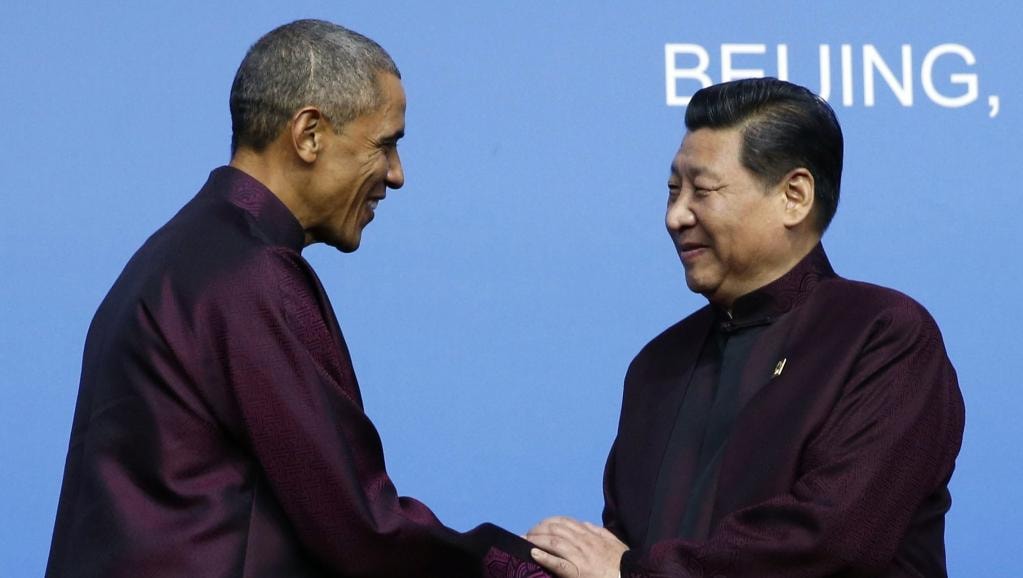China-US Relations: Depends on the Ability to Accept Differences!
(Baonghean.vn) - Chinese President Xi Jinping and US President Barack Obama had a dinner party on November 11 and a joint press conference on November 12. The contents of the exchanges between the two powerful figures leading the world's first and second largest economies became the focus of public attention. There are always unbridgeable gaps between the US and China because each side needs to promote its influence, which means finding ways to limit the influence of the other side. So, at these meetings, will either side "be willing to de-escalate"?
 |
| US President Barack Obama (left) and Chinese President Xi Jinping at the APEC celebration party in Beijing on November 10, 2014. Photo: Reuters |
| RELATED NEWS |
|---|
The first notable point is that Mr. Xi chose a dialogue method that affirms its own identity. Without beating around the bush, without denying or hiding the differences, Mr. Xi Jinping affirmed that China has been and is on the right path of Socialism with its own identity. Thus, the first thing is that Mr. Xi put Mr. Obama in a position where he had to accept the difference in political institutions. And once he accepted the difference in political institutions, every dialogue on human rights and democracy, each side will certainly have its own perceptions and criteria. Mr. Obama cannot impose the view of the American "free world" on China's political institutions. This is really how Mr. Xi put Mr. Obama in a difficult position.
From this starting point, Mr. Tap suggested that the two sides regularly exchange, call, talk more frankly and closely to strengthen bilateral relations.
On the US side, it seems that Mr. Obama came to China this time with worries about the remaining two years of his tenure as the White House boss, when the recent congressional elections seemed like a private game of the Republican Party. Is that why Mr. Obama's statements this time were full of excuses, seeking "sympathy" from China?
First, before the APEC economic leaders meeting, Mr. Obama said that the United States “very much welcomes China's prosperity, peace and stability.”
Second, Mr. Obama affirmed that the US does not seek to contain China but even considers Beijing a good partner in many aspects.
Third, in the joint press conference, Mr. Obama proactively “explained” that “the United States has nothing to do with promoting the protests in Hong Kong.” The reason Mr. Obama said that was because China still believes that there are foreign forces involved in the protests in Hong Kong. That was also implicitly mentioned in Mr. Xi Jinping’s rather tough response: “Hong Kong’s issues are China’s internal affairs and other countries should not interfere.”
At these meetings, the leader of the host country of APEC 22 talked a lot about differences and said that for the Sino-US relationship to develop well, the differences between China and the US must be accepted. The point that Mr. Xi emphasized was that the two countries must understand each other, respect each other and live in harmony alongside those differences. That said, it seems that Mr. Xi himself does not accept the differences from the US side.
After these meetings, analysts said that Mr. Obama is trying to bring China closer to the US. The reason is obvious: to resolve hot spots such as the Ukraine issue, the issue of destroying the self-proclaimed Islamic State (IS), the Syria issue, especially the "confrontational" differences with Russia, the US really needs to draw China closer to its side. That is also the reason why Mr. Obama attended APEC 22 mainly to justify and seek closer relations with China. However, while the US is actively "appealing" to China, Mr. Xi Jinping shows little interest in that goodwill. And Mr. Xi Jinping always avoids so that what Obama wants cannot happen. This is not difficult to explain, because China is not happy with the US's decision to pivot to Asia - Pacific. Therefore, what China needs to do is to do everything possible to prevent US influence in the Asia - Pacific region. This APEC in Beijing is the best opportunity for Xi Jinping to say that. In his speech “Asia-Pacific Dream”, Xi Jinping has put out a very clear message: Asia-Pacific belongs to Asia-Pacific people. That means there will be no room for the US or anyone else outside the region to participate.
So it is clear that differences are not yet accepted, and US-China relations are still fraught with difficulties.
Chi Linh Mountain


